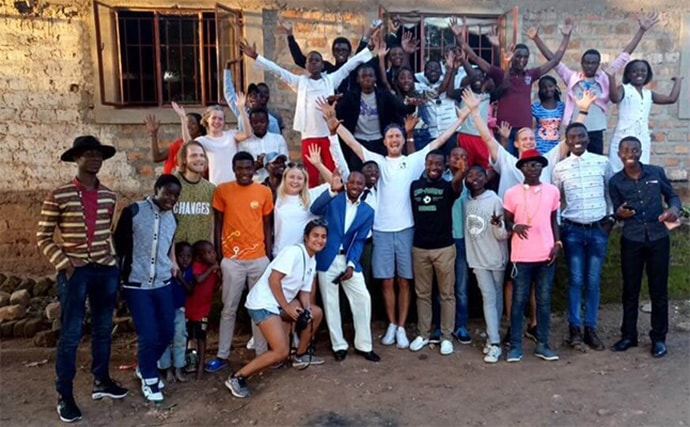Blog
Posted on January 19, 2022

We warmly welcome SEF as one of our newest partners in East Africa. SEF is a registered youth-led organization based in Kampala, Uganda that primarily serves refugees from the Democratic Republic of Congo, Burundi, and South Sudan. The co-founders, Jules Meyele and Jeremiah Lukeka, are themselves refugees.
Through our discussions with Jules and Jeremiah (via Zoom), we learned of the great challenges these refugees experience when they arrive in Uganda. After traumatic experiences in their home country, adjusting to a completely new and different culture can be very difficult. These refugees must deal with language barriers, unemployment, difficult access to formal school, and discrimination from the local communities.
SEF’s programs and services are tailored to promote youth development and leadership. They provide education, community building, and integration activities to support refugee youth to strengthen the skills they need, not only to survive in the face of trauma, stress, displacement, and deprivation, but to become self-reliant and potential leaders in their community.
Pangea’s grant, SEF’s first outside funding in their 6-year history, will be used to expand “Women at the Wheels.” This project is a successful vocational training program that focuses on tailoring and craft skills, along with basic business and entrepreneurship curricula. Women completing the program can use their newly acquired skills to make a living and become more self-sustaining.
We are excited to begin this new partnership and look forward to learning more about SEF and the communities that they serve.
Posted on January 14, 2022
2021 was a year of continued evolution of COVID, which exposed and exacerbated many weaknesses in our global society including gender inequality, supply chains, and vaccine inequities. Additionally, there have been many crises including the Haiti earthquake, the Taliban takeover of Afghanistan, refugees fleeing violence in the Tigray region of Ethiopia, and the famine in Yemen, to name but a few.
Our global community has been responding, some with much success, to these and many ongoing issues. Below is a summary of our 2021 Issue Campaigns, events, spotlights, and features we have been reporting on culminating with an amazing Goalmakers Annual Conference. We hope you find these informative and useful for your ongoing mission work.
2021 ISSUE CAMPAIGNS
- February: Climate Justice (SDG 13): Climate change has a greater impact on people living in low- and middle-income countries with few monetary resources, poor health conditions, insecure land rights, and fragile infrastructure. The climate impacts we are already seeing include severe droughts, growing food insecurity, wider disease transmission, and rising seas that threaten the very existence of many coastal cities and island nations. As is often the case, those who are most affected by a crisis have a great deal of insight and knowledge to create effective solutions. While Indigenous communities are often at greater risk from environmental degradation and climate effects, their long history of living from and caring for the land provides a unique perspective and an integrated set of solutions that can make sustainability a reality and help turn the tide on the climate crisis. Our February Issue Brief, Organization Profile on Landesa, Goalmaker Spotlight on James Mulbah from the Earthworm Foundation, and guest blog from Agros talks to the above points and issues. Additionally, we co-hosted an event with the Posner Center for International Development on “Climate Justice and Indigenous Rights”.

Image credit: Nia Tero.
Continue Reading
Posted on December 14, 2021
Behind the ‘1 Billion’ Vaccination Headline
By Sattva Consulting’s Research Advisory team: Anisha Lalvani, Research Consultant, Geetika Dang, Sr Research Consultant and Sansidha Pani, Sr. Research Consultant
The world has conducted its most extensive vaccination program in history with the COVID-19 vaccination drive. As of 2nd December 2021, more than 8.05 billion doses have been administered across 184 countries, amid worries that existing vaccines might prove ineffective to tackle the newest variant —Omicron.
However, despite significant progress, the world is still experiencing high vaccine hesitancy.
India recently celebrated the administration of more than 1 billion vaccination doses as of 2nd December 2021, although only ~50.5%[1] of the eligible population (18+) has received both doses.
This article explores the ground realities behind these feats and shares insights and solutions to address vaccine hesitancy with stakeholders tackling similar issues globally.
Continue Reading

